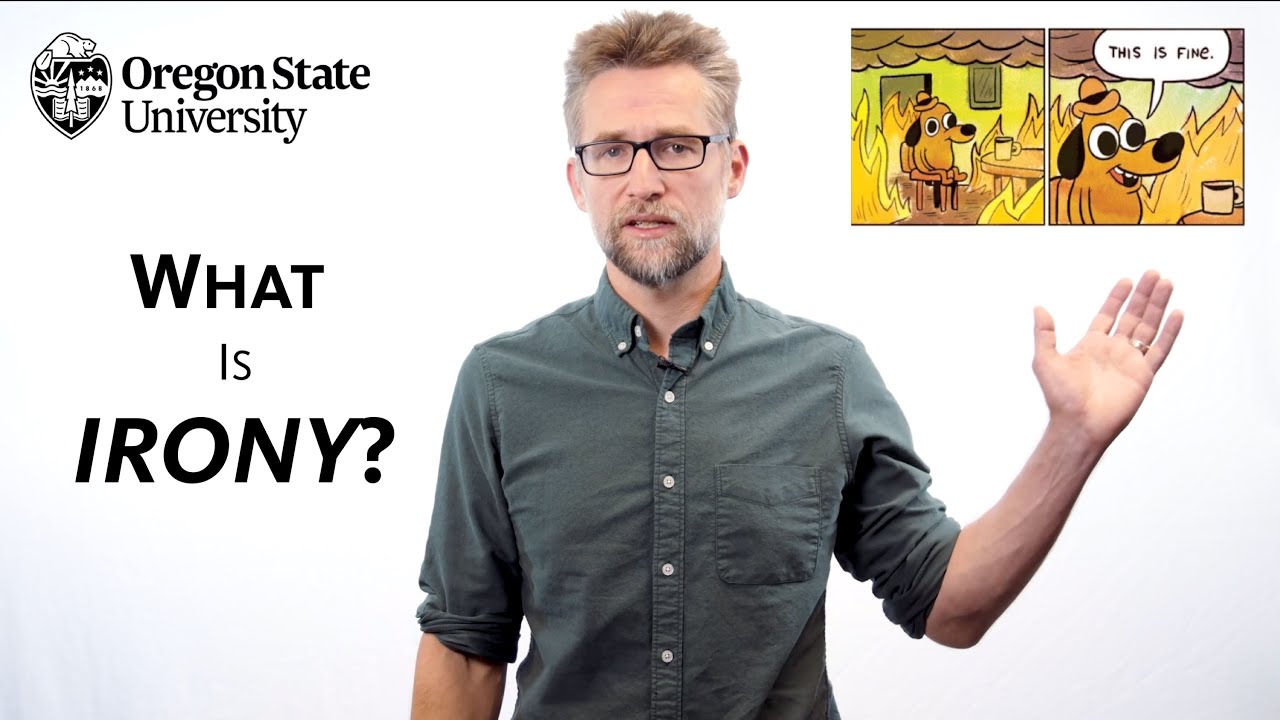What is verbal irony? - Christopher Warner
Summary
TLDRThis script delves into the concept of verbal irony and its relationship with sarcasm. It explains how verbal irony occurs when someone says the opposite of what they mean, and explores how tone and context can shift the meaning of phrases like 'Great weather we're having!' or 'Awesome job!'. While all sarcasm involves verbal irony, not all verbal irony is sarcastic. The script also distinguishes between the two, highlighting examples in both humorous and pointed contexts. The narrator encourages viewers to find instances of verbal irony and sarcasm in everyday interactions.
Takeaways
- 😀 Verbal irony occurs when a speaker says the opposite of what they actually mean.
- 😀 Sarcasm is a form of verbal irony that includes a mocking or critical tone to emphasize the opposite of what is said.
- 😀 An example of verbal irony: Saying 'Great weather we're having' when the weather is actually bad.
- 😀 Sarcasm adds an extra layer of mockery or criticism, as seen in 'Awesome job!' after someone rear-ends a car.
- 😀 Not all verbal irony is sarcastic; some instances simply involve the opposite of what is meant without a mocking tone.
- 😀 The tone of voice is key in distinguishing sarcasm from verbal irony—sarcasm has a sharper, more mocking tone.
- 😀 An example of sarcasm: 'You're a talented athlete' when said to a clumsy child, mocking their lack of athletic ability.
- 😀 Verbal irony can sometimes be neutral, where the speaker merely says the opposite of what they mean, without mockery.
- 😀 A sincere compliment, like 'You're a talented athlete' to an Olympian, has no verbal irony or sarcasm.
- 😀 Understanding verbal irony and sarcasm helps us better interpret people's tone and intentions in conversations.
Q & A
What is verbal irony?
-Verbal irony occurs when a speaker says something but means the opposite. For example, saying 'Great weather we're having!' when the weather is actually terrible.
How does verbal irony differ from sarcasm?
-While both involve saying the opposite of what is meant, sarcasm typically carries a mocking or harsh tone, while verbal irony might not. Sarcasm is a more pointed form of verbal irony.
Can sarcasm always be considered verbal irony?
-Yes, all sarcasm is a form of verbal irony, but not all verbal irony is sarcastic. Verbal irony doesn’t necessarily involve a mocking attitude.
Can you give an example of verbal irony without sarcasm?
-Sure! If someone says 'Nice job!' to someone who is struggling with a task, but without a mocking tone, it may simply be verbal irony, not sarcasm.
Why is 'Awesome job!' an example of sarcasm when said to someone who made a mistake?
-'Awesome job!' becomes sarcasm because it not only expresses the opposite of what is meant, but it also carries a mocking tone, making fun of the person's mistake.
What role does tone of voice play in determining whether a statement is verbal irony or sarcasm?
-The tone of voice is crucial. A mocking or cutting tone often turns verbal irony into sarcasm, while a neutral tone might simply indicate verbal irony.
How can we tell when someone is being sarcastic?
-Sarcasm is typically easier to identify due to its sharp, mocking tone. It often implies a criticism or ridicule, going beyond just saying the opposite of what’s meant.
Can you identify an example of verbal irony that does not involve sarcasm from the script?
-An example of verbal irony without sarcasm is when someone says 'Great weather we're having!' on a rainy day without intending to mock the situation.
What is the purpose of using verbal irony in communication?
-Verbal irony can be used to highlight a contrast between reality and expectation, often adding humor or emphasizing how absurd a situation is.
Why does the speaker mention that not all verbal irony is sarcastic?
-The speaker highlights that verbal irony simply involves saying the opposite of what is meant, without the additional mocking or mean-spirited intention that characterizes sarcasm.
Outlines

Cette section est réservée aux utilisateurs payants. Améliorez votre compte pour accéder à cette section.
Améliorer maintenantMindmap

Cette section est réservée aux utilisateurs payants. Améliorez votre compte pour accéder à cette section.
Améliorer maintenantKeywords

Cette section est réservée aux utilisateurs payants. Améliorez votre compte pour accéder à cette section.
Améliorer maintenantHighlights

Cette section est réservée aux utilisateurs payants. Améliorez votre compte pour accéder à cette section.
Améliorer maintenantTranscripts

Cette section est réservée aux utilisateurs payants. Améliorez votre compte pour accéder à cette section.
Améliorer maintenant5.0 / 5 (0 votes)






